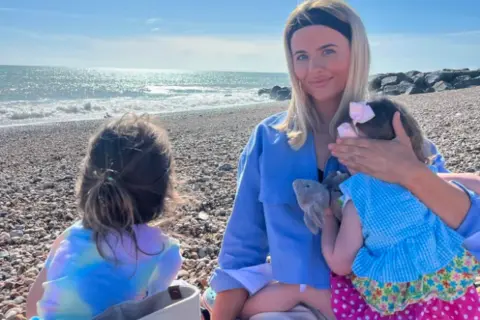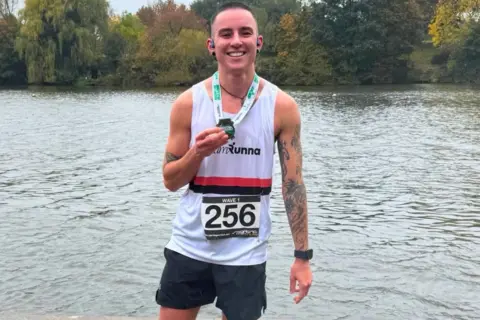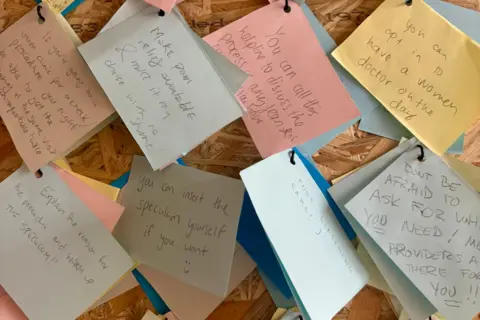
‘It was over before I knew it’
- Health
- February 2, 2025
- No Comment
- 105
 Erica Donnelly, Jessica Tse, Jack Latham
Erica Donnelly, Jessica Tse, Jack LathamPeople not knowing about options to make their cervical screening easier and more comfortable is “costing lives”, a cancer charity warned last month.
To find out what having the test is really like for first timers, the BBC spoke to six people who have had their first cervical screening, formerly known as a smear test, in the last six months.
Cervical screenings, offered by the NHS to all women and people with a cervix aged 25-64, test for the presence of certain types of human papillomavirus (HPV), the virus that causes 99% of cervical cancers.
During the test, a nurse uses a speculum – a tool to open the vagina – and a brush to take a sample of cells from the cervix.
This is what having the test done for the first time was like for six people, and what they wish they’d known beforehand.
How did you feel beforehand?
Erica Donnelly, 26, who lives in Sunderland, waited about a year to book her screening appointment after receiving an invite.
“I was in a massive panic about it because I have PTSD relating to sexual trauma, so I was really extra nervous about that,” she says.
When she finally had the test done last month, she brought her partner with her for support and to help her in case she had a flashback or a panic attack. Having them there also made the experience feel more “comfortable and casual”, she says.
Bianca Ionici, 27, who lives in London, says she put off her cervical screening “for at least two years” because of concerns about pain.
But after getting another invite which contained a lot of information about the process, Bianca booked her screening in January.
 Bianca Ionici
Bianca IoniciOther people say they booked their screenings as soon as they could.
Eleanor Gratton, who had her test at the end of last year aged 25, says her friends were scared the process would be “uncomfortable and painful”. But as more and more people in her group had their screenings, she says they didn’t find this to be the case.
What did the test feel like?
Jessica Tse was “really anxious” before her cervical screening in December.
“I didn’t know if it was going to hurt”, she says.
But the nurse was “talking to me, distracting me throughout” and explained the procedure “really clearly”, she adds.
“Pain-wise, it was uncomfortable and it was something I hadn’t felt before,” Bianca recalls.
But “it was over before I knew”, she says.
Others say they didn’t experience any discomfort – like Megan Burns, a social media content creator living in Brighton.
“It was nothing,” says Megan, who had her first screening in September aged 25. “I couldn’t feel anything.” She says the fact she’d already had two children made her less anxious about the experience.
 Megan Burns
Megan Burns“These nurses have seen everything,” Megan adds.
Some people feel under pressure to shave their pubic hair or wear their best underwear, she says. But speaking as a former healthcare worker, Megan says “you’re there to do a job, you don’t care about these things”.
While most people only feel light pain at their appointments, some people do experience more discomfort at their appointments.
“Some people find cervical screening uncomfortable, but it shouldn’t be painful,” the Eve Appeal says. It notes that some conditions like endometriosis, vaginismus and being menopausal can make the screening painful.
The NHS says that patients are in control of screening and “can ask the nurse to stop at any time”.
Did you know about the adjustments available?
People can ask for adjustments to make their screening easier or more comfortable. These include:
- A smaller speculum (the tube-shaped tool that’s inserted into the vagina to help the nurse to take the sample)
- A longer appointment so you’re not rushed
- More lubrication
- Moving to a different position
- Inserting or guiding the speculum yourself
- Bringing a friend for support
But very few people are aware they can request these accommodations, according to recent research by the Eve Appeal. Less than a quarter of people surveyed said they knew they could request a smaller speculum and only 12% said they knew they could ask for a double appointment.
Some of the people the BBC spoke to said they weren’t aware they could have asked for accommodations.
Bianca says she asked the nurse to use a smaller speculum after reading about it online.
But she thinks information about adjustments should be flagged more clearly when you book the appointment, because some need to be thought about in advance – like bringing a friend or booking a double slot.
What is it like to have the test as a transgender man?
Jack Latham, a 28-year-old personal trainer living in Kent, says he received his first screening invite aged 25, just after he came out as trans. He says his GP was “incredibly supportive” and there was even a poster in his surgery’s waiting room encouraging trans men to have a cervical screening.
Trans and non-binary people who have a cervix should still have regular cervical screenings.
Jack says he’d put off the appointment out of fear, until he went for a blood test in summer 2024 and the nurse offered him a cervical screening on the spot.
 Katie Reynolds
Katie Reynolds“It was so much quicker and much less of a bigger deal,” Jack says. “It’s nowhere near as bad as you think it will be.”
Some trans men previously told the BBC they had not been invited to get cervical screenings because they were listed as male on medical records, though they still had a cervix.
How could the process be improved?
The NHS wants to encourage more people to go for their cervical screenings. NHS England has promised to eliminate cervical cancer by 2040.
Women aged 25-49 are encouraged to have a screening every three years, while women aged 50-64 should have one every five years.
NHS England data from March 2024 showed 44.5% of women aged 25-29 had not been screened in the last 3.5 years. For those aged 30-34, this figure was 35.3%.
The proportion of younger women who have been adequately screened has been falling a little in recent years.
Dr Sue Mann, NHS national clinical director for women’s health, told the BBC in a statement that medics know that some women find screenings “very worrying and uncomfortable”.
She emphasised that adjustments are always available and that women should book their screenings, even if they were invited months or years ago.
A display at the Vagina Museum in east London last year encouraged visitors to write improvements they’d like to see to the NHS’s cervical screening service on slips of paper.
 Ella Clancy @designermakerella
Ella Clancy @designermakerellaArtist Ella Clancy, who produced the display, says common requests included more information about the adjustments available – especially asking for smaller speculums – nurses talking people through exactly what they were doing as they performed the screening and staff being more trauma-aware.
Eleanor says there should be more education around what HPV is. School pupils are typically vaccinated against HPV between year eight and year 10 but Eleanor says it wasn’t clear at the time what the jab was for.
Jessica thinks doctors should explain the results using plainer language, and says she had to call her GP for further explanation after receiving her results letter.
Would you rather do the test yourself?
Some people prefer to carry out medical tests in the comfort of their own homes where possible. Do-it-yourself cervical tests are available in some countries, and researchers at King’s College London trialled them in London in 2021 with “fantastic” results. They involve doing a vaginal swab which is then sent to a lab.
The NHS said last year it was assessing whether to roll the scheme out more widely.
Eleanor says she felt “reassured” knowing that a healthcare professional performed her first screening, but would try doing an at-home version of the test after that if the option were available.
Jack, on the other hand, has his doubts. He says he’d prefer an at-home kit for “the convenience and flexibility” but that he’d “have some hesitation about whether I’d done it correctly”.
If you’ve been affected by any of the issues mentioned in this article, please visit BBC Action Line, where you can find support
#knew










